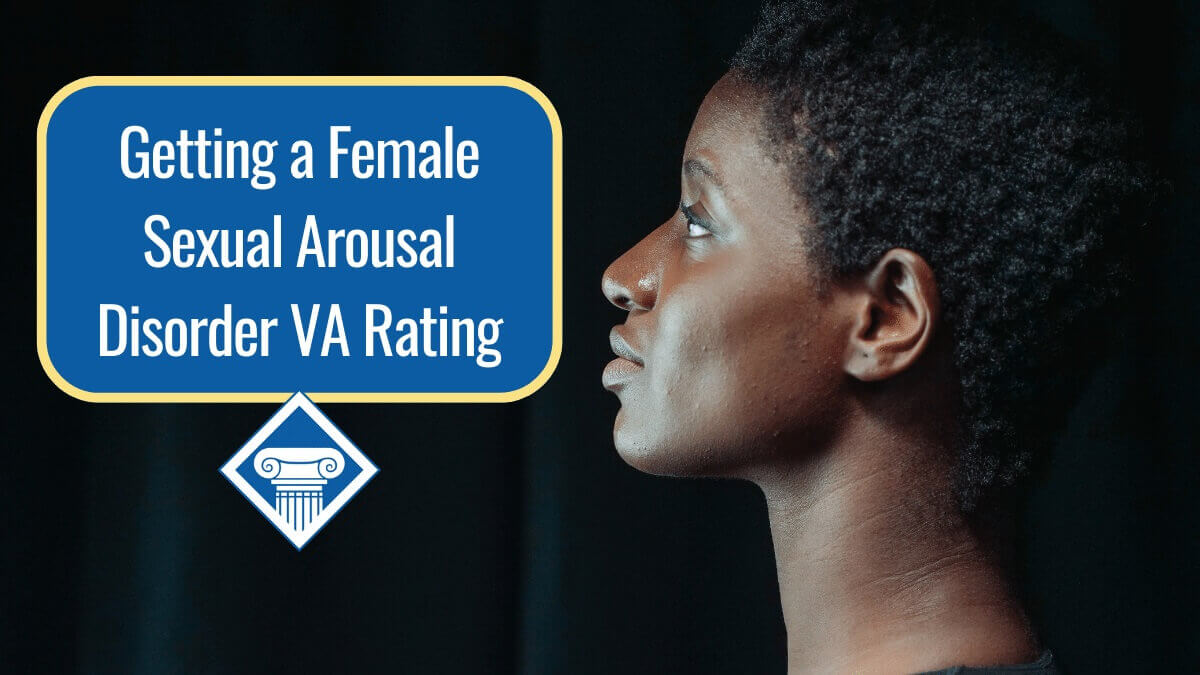Sexual health is important to a woman’s physical and mental well-being. Often, women find that some health problems lead to trouble having sex or getting aroused, or a lack of interest in sex altogether.
Let’s appeal your VA decision today

Whether due to physiological, psychological, or relational factors, female sexual arousal disorder (FSAD, formerly referred to as the outdated-term “frigidity”) can cast a shadow over your sense of self and negatively affect the health of relationships.
Military life comes with its own set of risk factors that could put women veterans at a higher risk of developing FSAD. In this article, we describe the causes and risk factors of FSAD and how veterans can get a female sexual arousal disorder VA rating.
In this article about the female sexual arousal disorder VA rating:
What is FSAD?
FSAD occurs when the body doesn’t respond to sexual stimulation. For many, symptoms come and go. Some symptoms may occur every time you try to engage in sexual activity, or they may only occur occasionally.
Because women diagnosed with FSAD don’t produce enough fluid to lubricate the vagina, symptoms can include painful or unsatisfactory sex, avoidance of sex and intimacy, and difficulty reaching orgasm. As a result, women diagnosed with FSAD may find their relationships with their partners become strained and less intimate.

Symptoms vary depending on the type of sexual dysfunction you experience. Some of the different types of sexual dysfunction include:
- Low libido
- Difficulty becoming sexually aroused
- Difficulty reaching orgasm
- Pain with sexual contact
There are both physical and psychological causes of FSAD, and most often, FSAD is caused by a combination of factors.
Female sexual arousal disorder VA rating
FSAD can be disruptive and may lead to a lower quality of life and poor self-esteem. If you’re a veteran with FSAD, you may be eligible for compensation from the VA.
FSAD is not rated like most conditions. The VA rates FSAD under diagnostic code 7632 in the Schedule of Ratings for gynecological conditions and disorders of the breast and can only be assigned a non-compensable rating of 0%.
Although veterans will not receive compensation from an FSAD VA rating, they may be eligible for other compensation for the condition, which we explain below.
The firm got me to 70%, and I was happy. Individual unemployability was awarded to me and to this day, I’m so grateful. My future is no longer bleak. These people work very hard for you.

R.C., a Navy veteran in Hawaii
From a Google review for Woods & Woods
VA special monthly compensation for FSAD
Veterans with FSAD may be granted special monthly compensation, or SMC, for loss of use of a creative organ related to FSAD.
SMC is a type of disability benefit for veterans that increases the compensation they receive for certain severe disabilities.
The VA provides SMC for various reasons, including the loss or loss of use of extremities and creative organs. For the loss or loss of use of creative organs, the VA will assign SMC level K, or SMC-K.
Creative organs are procreative or reproductive organs such as ovaries, testicles, and uteri.
Women with loss of use of one or both ovaries may be entitled to SMC(K) if:
- It resulted from wounds or other trauma sustained during military service
- It is traceable to an operation you had during service for the relief of another condition
- It is traceable to an operation that was required after discharge to correct an injury caused by military service
The VA adds SMC-K to the veteran’s regular amount of monthly compensation. You can see the current SMC-K rates on the VA’s website.
Secondary service connection for FSAD
FSAD can be secondary to several other conditions commonly caused by military service.
To establish a secondary service connection for FSAD, veterans must submit evidence to show that FSAD is medically related to another service-connected disability. This means another service-connected disability caused FSAD.
If you are diagnosed with a service-connected condition that led to FSAD, you may be eligible for a VA rating for FSAD secondary to other conditions.
These conditions may include:
- Heart disease
- Spinal injury
- Depression
- Anxiety
- PTSD
- High blood pressure
- Cancer
- Kidney failure
- Multiple sclerosis
- Bladder problems
- Eating disorders/low BMI
Side effects from certain medications including antidepressants, chemotherapy drugs, sedatives, high cholesterol, and blood pressure medications are also linked to a decrease in sexual function. If treatment for a service-connected condition negatively affects your sexual function, it could be connected on a secondary basis.

VA rating for FSAD secondary to PTSD
FSAD and PTSD are closely related, especially when a veteran’s PTSD stems from military sexual trauma (MST).
Although both males and females may experience MST during service, it affects a higher percentage of women. In fact, one out of every three female veterans report that they experienced MST.
Sexual assault survivors in both the military and civilian populations show a higher rate of PTSD, and research shows a strong association between sexual abuse, sexual harassment, sexual assault, and symptoms of sexual dysfunction.
If you’re a veteran with service-connected PTSD and you’ve also experienced symptoms of sexual dysfunction, you can file a claim for an FSAD VA rating secondary to PTSD.
TDIU for FSAD
It’s rare to receive TDIU for FSAD alone. However, if your FSAD is secondary to another, higher-rated disability like PTSD, you may be eligible to receive this benefit.
From the day we contacted [Woods & Woods], they made us feel so comfortable. They treated us like we mattered and we were not just clients but family.

L.B., a Navy veteran and wife in Florida
From a Google review for Woods & Woods
For veterans who are unable to work due to a service-connected condition, total disability based on individual unemployability (TDIU) could be available. TDIU pays the same $3,938.58 as a 100% rating even though the condition is rated below 100%.
To receive TDIU, a veteran must have:
- At least one service-connected disability rated at least 60%
- OR two or more service-connected disabilities with a combined rating of 70% or more, including one single disability rated at 40% or more
How Woods & Woods can help
If you have a service-connected condition that affects your ability to live and work comfortably, you deserve VA disability compensation. Contact Woods & Woods today for a free consultation to see how we can help. You only pay us if we win.

Get help from a VA-accredited attorney
Frequently asked questions
The VA rates FSAD under diagnostic code 7632 in the Schedule of Ratings for gynecological conditions and disorders of the breast and can only be assigned a non-compensable rating of 0%. However, veterans with FSAD may be granted special monthly compensation, or SMC, for loss of use of a creative organ related to FSAD.
MST is prevalent among veterans, especially female veterans. MST is closely associated with symptoms of sexual dysfunction, including female sexual arousal disorder.





